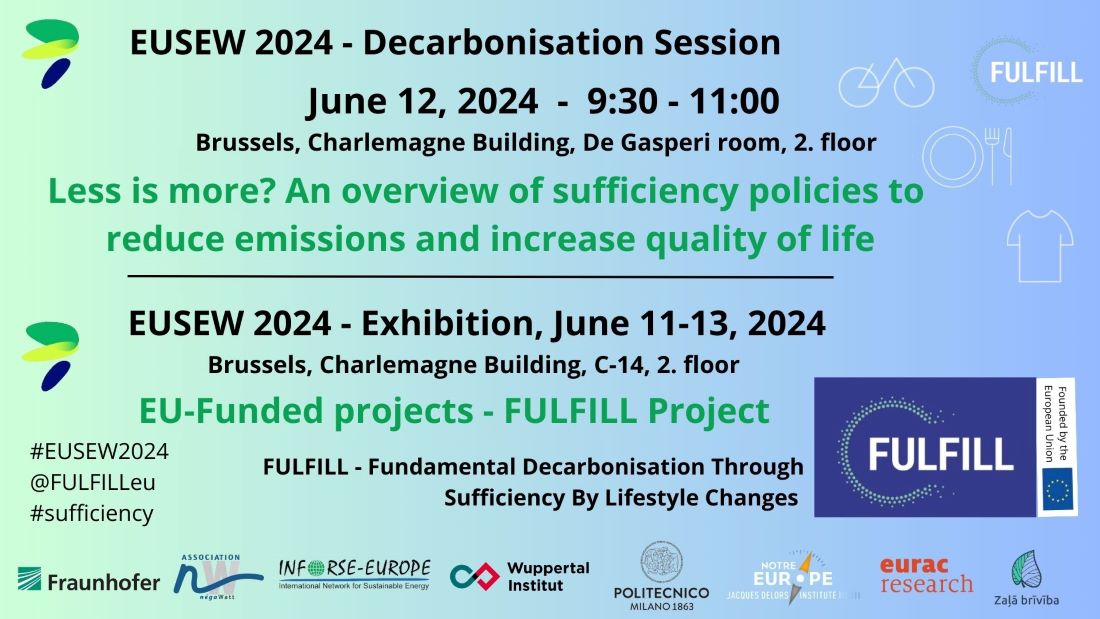| About Us | Contact Us | Member Database | Contact Database | Support Us |
INFORSE at the Conference and Exhibition
June 11-13, 2024
 |
INFORSE-Europe organised conference session and exhibited at the EUSEW 2024 - European Sustainable Energy Week 2024 in Brussels, Belgium. | |
INFORSE-Europe
participated
at the exhibition in the Charlemagne building (C-14, 2 fl.) and
co-organised a policy conference event on the FULFILL Project
on decarbonisation through sustainable
lifestyle. The FULFILL project is funded by the EU Horizon 2020
Program. |
||
• June
11-13, 2024 New
research, analysing 21,000 surveys, 50 citizen initiatives,
16 policies, and 3 workshops, shows how sufficiency policies
can
reduce emissions and increase well-being. The session covers
results, impact quantification, National Energy and Climate
Plan recommendations, and political commentary. From the Program
presentations, comments and dialoge of a panel: More information: |
||
| The description of the
stand at EUSEW 2024 website: INFORSE-Europeís stand at the Energy fair featured the results of an EU Horizon funded research project called "FULFILL" on decarbonisation through sufficiency - sustainable lifestyles. A sufficiency - sustainable lifestyle is increasingly recognised for its potential towards decarbonisation in Europe. Sufficiency actions and policies are contributing to reduce greenhouse gases, and at the same time increase wellbeing. It is a win-win. The IPCCC has defined the 3 pillars of the energy transition: Sufficiency, Efficiency, Renewables (SER), and estimates that by 2050, sufficiency will have the potential to reduce emissions by more than 50% in almost all sectors, compared to current policy scenarios. The FULFILL Project's research analysed what motivates people, which policies could motivate more, and how acceptable these sufficiency policies are deemed. The policies are in the sectors of housing, food, transport, and items. They will present interesting findings and case studies made by 50 citizens initiatives, 16 policies and 9,500 people surveyed e.g., pointing out differences in age, countries, and gender. Finally, results from an input/output model will be presented, which was established to calculate the decarbonising effects of different policies. The stand shows how much our lifestyles are contributing now to decarbonisation and how much is the potential. How can citizens decrease their own carbon footprint and increase wellbeing? How can policymakers help? What can the EU do? What can the EU countries do? How the framework of RES (Renewables-Efficiency-Sufficiency) is possible in the brand new European CLEVER Scenario will also be presented. The FULFILL project's research has been done in 5 EU countries by a consortium of researchers and CSOs: Fraunhofer Institute ISI (coordinator) and Wuppertal Institute in Germany, EURAC and POLIMI in Italy, negaWATT and Jacques Delors Institute in France, Green Liberty in Latvia, and INFORSE-Europe in Denmark INFORSE-Europe is a network of 60+ civil society organisations in EU 27 and beyond, promoting sustainable energy and defending the environment, moving towards a 100% renewable-energy future through increased use of renewable energy, energy efficiency and recently also through energy sufficiency / sustainable lifestyle. |
||
| You can see the list of Exhibitors at EUSEW Energy Fair 2024 - See us on facebook and twitter. | ||